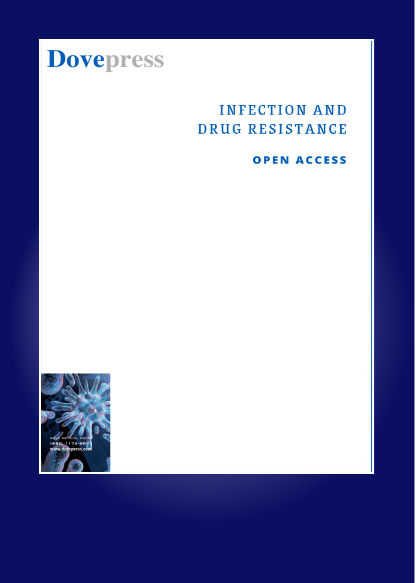阿奇霉素对变异肺炎支原体肺炎患儿的疗效
IF 2.9
3区 医学
Q2 INFECTIOUS DISEASES
引用次数: 0
摘要
目的:在中国,肺炎支原体(MP)对大环内酯类药物高度耐药。然而,大环内酯类药物对一些耐大环内酯类药物的患者仍有临床疗效。我们倾向于探讨阿奇霉素对A2063/2064G突变的肺炎支原体肺炎(MPP)患儿的有效性:这项回顾性观察队列研究在重庆医科大学附属儿童医院进行。回顾性纳入了被诊断为 MPP 的耐大环内酯类药物突变(A2063/2064G)儿童。采用接收者操作特征曲线(ROC)和逻辑回归分析来评估和确定对大环内酯类药物无反应的肺炎支原体肺炎(MUMPP)A2063/2064G突变患儿治疗失败(进展为难治性肺炎支原体肺炎[RMPP])的独立危险因素:对 155 名儿童进行了回顾性登记。超过 20% 的患者(36/155,23.23%)在接受阿奇霉素治疗 3 天内出现衰竭。54名患者(54/155,34.84%)被确诊为RMPP,住院期间RMPP的发生率为22.72/1000人天。逻辑回归分析显示,乳酸脱氢酶(LDH)≥ 399(U/L)是 RMPP 的独立危险因素(几率比 [OR] 4.66,95% 置信区间 [CI] 1.31-17.10,P=0.017)。在随访的一年中,RMPP 患者的阻塞性支气管炎和支气管扩张的发病率明显高于非 RMPP 患者(分别为 16.67% vs 1.98%,P=0.001;9.26% vs 0.00%,P=0.005):结论:阿奇霉素对A2063/2064G突变的MPP儿童有效。对于A2063/2064G突变的MUMPP患儿,LDH≥399(U/L)的患儿进展为RMPP的风险显著升高,应考虑使用其他抗生素(如四环素类和氟喹诺酮类)治疗。本文章由计算机程序翻译,如有差异,请以英文原文为准。
Azithromycin Effectiveness in Children with Mutated Mycoplasma Pneumoniae Pneumonia
Objective: Mycoplasma pneumoniae (MP) is highly resistant to macrolides in China. However, macrolides still exhibit clinical effectiveness in some macrolide-resistant patients. We tend to explore azithromycin effectiveness in Mycoplasma pneumoniae pneumonia (MPP) children with A2063/2064G mutation.
Methods: This retrospective observational cohort study was conducted at the Children’s Hospital of the Chongqing Medical University. Children with macrolide-resistant mutations (A2063/2064G) diagnosed as MPP were retrospectively enrolled. Receiver operating characteristic (ROC) curves and logistic regression analysis were used to evaluate and identify independent risk factors for treatment failure (progress to refractory Mycoplasma pneumoniae pneumonia [RMPP]) in macrolide-unresponsive Mycoplasma pneumoniae pneumonia (MUMPP) children with the A2063/2064G mutation.
Results: One hundred fifty-five children were retrospectively enrolled. More than 20% (36/155, 23.23%) of patients experienced defervescence within 3 days of azithromycin treatment. RMPP was diagnosed in 54 patients (54/155, 34.84%) and the incidence of RMPP during hospitalization was 22.72 per 1000 person-days. Logistic regression analysis showed that lactate dehydrogenase (LDH) ≥ 399 (U/L) was an independent risk factor for RMPP (odds ratio [OR] 4.66, 95% confidence interval [CI] 1.31– 17.10, P=0.017). During the year followed, RMPP patients had a significantly higher incidence of bronchiolitis obliterans and bronchiectasis than non-RMPP patients (16.67% vs 1.98%, P=0.001; 9.26% vs 0.00%, P=0.005, respectively).
Conclusion: Azithromycin was effective in children with MPP with the A2063/2064G mutation. For MUMPP children with A2063/2064G mutation, children with LDH ≥ 399 (U/L) had significant higher risk for progression to RMPP, and should consider to be treated with alternative antibiotics (eg tetracyclines, and fluoroquinolones).
Keywords: azithromycin effectiveness, A2063/2064G mutation, mycoplasma pneumoniae pneumonia, children
Methods: This retrospective observational cohort study was conducted at the Children’s Hospital of the Chongqing Medical University. Children with macrolide-resistant mutations (A2063/2064G) diagnosed as MPP were retrospectively enrolled. Receiver operating characteristic (ROC) curves and logistic regression analysis were used to evaluate and identify independent risk factors for treatment failure (progress to refractory Mycoplasma pneumoniae pneumonia [RMPP]) in macrolide-unresponsive Mycoplasma pneumoniae pneumonia (MUMPP) children with the A2063/2064G mutation.
Results: One hundred fifty-five children were retrospectively enrolled. More than 20% (36/155, 23.23%) of patients experienced defervescence within 3 days of azithromycin treatment. RMPP was diagnosed in 54 patients (54/155, 34.84%) and the incidence of RMPP during hospitalization was 22.72 per 1000 person-days. Logistic regression analysis showed that lactate dehydrogenase (LDH) ≥ 399 (U/L) was an independent risk factor for RMPP (odds ratio [OR] 4.66, 95% confidence interval [CI] 1.31– 17.10, P=0.017). During the year followed, RMPP patients had a significantly higher incidence of bronchiolitis obliterans and bronchiectasis than non-RMPP patients (16.67% vs 1.98%, P=0.001; 9.26% vs 0.00%, P=0.005, respectively).
Conclusion: Azithromycin was effective in children with MPP with the A2063/2064G mutation. For MUMPP children with A2063/2064G mutation, children with LDH ≥ 399 (U/L) had significant higher risk for progression to RMPP, and should consider to be treated with alternative antibiotics (eg tetracyclines, and fluoroquinolones).
Keywords: azithromycin effectiveness, A2063/2064G mutation, mycoplasma pneumoniae pneumonia, children
求助全文
通过发布文献求助,成功后即可免费获取论文全文。
去求助
来源期刊

Infection and Drug Resistance
Medicine-Pharmacology (medical)
CiteScore
5.60
自引率
7.70%
发文量
826
审稿时长
16 weeks
期刊介绍:
About Journal
Editors
Peer Reviewers
Articles
Article Publishing Charges
Aims and Scope
Call For Papers
ISSN: 1178-6973
Editor-in-Chief: Professor Suresh Antony
An international, peer-reviewed, open access journal that focuses on the optimal treatment of infection (bacterial, fungal and viral) and the development and institution of preventative strategies to minimize the development and spread of resistance.
 求助内容:
求助内容: 应助结果提醒方式:
应助结果提醒方式:


